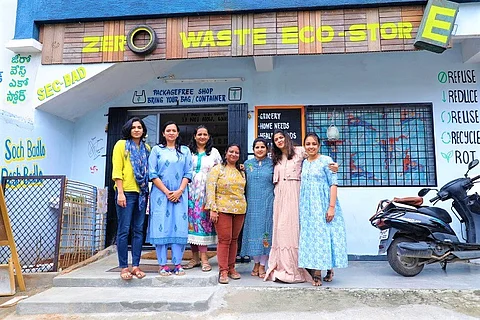

Jyothi and Pankaj, a chartered accountant by profession, used to shop from EcoIndian, a zero-waste organic store in Chennai, where they lived. On returning to Hyderabad, the couple was disappointed that they could not find anything similar in the city. That’s when they decided that like Chennai, Bengaluru and Goa, Hyderabad, too, needed its own eco-friendly store that generates zero waste.
Today, tucked away in the alleys of Secunderabad, Zero Waste Eco-store has about 150 items - from rice, grains to homemade pickles and snacks - all stored in glass and metal containers. “This is our little contribution to reducing the usage of plastic in our everyday lives,” Pankaj tells TNM.
Opened in September, the Zero Waste Eco-store isn’t like other grocery stores. The shelves are extraordinarily neat. Grains and pulses are aesthetically arranged in glass containers and metallic boxes. The shop has coffee scrubs, herbal soaps, organic shampoo and cutlery packed in small pouches. Many of the products at the shop are homemade by women, especially the pickles and cloth bags.
After Pankaj and Jyothi decided to set up the store, the first task they had at hand was to identify sellers who were ready to pack items without using plastic.
“We found a lot of them at the wholesale market but very few were willing to sell them without using plastic packages. So, we decided to get our own metal containers and jars to transport the items. Since we began with only limited quantities of each item, this also was an issue as sellers were used to selling them in bulk,” Pankaj says.
Pankaj and Jyothi
A customer cannot just enter the shop emptyhanded. One needs to get their own cloth/paper bags or metal containers or buy a few cloth bags from the shop to pack the items.
All items are sourced from individuals across states. Stored in small glass containers, pickles – mango, lemon and chilli – are one of the fastest moving items in the store, the couple say.
“We purchase the pickles from an elderly lady who sets up a stall at a nearby locality every weekend. The coffee scrubs are procured from Two’s Company in Chennai and the soaps from a seller in Hyderabad,” Pankaj says.
“These individual sellers, too, focus on sustainable living and understand when we request them not to send their products packed in plastic. For example, the manufacturer of these turmeric soaps took great care in packing it with only a layer of paper after we insisted on zero usage of plastic,” Pankaj explains, as he opens a pack of turmeric soaps.
Some of the pulses at the shop are stored in gravity bins, made of acrylic with a dispenser, and it makes packing of items much easier. The shop’s shelves are made of wood. The couple has even used old pushcarts to display mud pots, bamboo brushes and other utensils.
“We bought the pushcart from the Jhummeraat Bazaar,” Jyothi says. Jhumeraat Bazaar is a popular shopping destination in Hyderabad, where used items are sold at throwaway prices. “The mud pots and other utensils were purchased from Monda Market and we sell them at almost wholesale market prices,” she says.
The eco-store has a range of homemade nibbles, all made at Pankaj and Jyothi’s home. There are homemade milk and tea masala powders, variants of green tea, dry fruits, chutney powder, and honey collected from apiary farms.
The couple also sells household cleaning liquids sourced from manufacturers who sell it to hospitals. “The only plastic brought to the store are the containers in which they sell the liquids. But once inside the shop, we transfer them to glass containers and sell them to customers who bring their own tins. They are sold at half the price because for every 500 ml we sell we are able to reduce the usage of a plastic bottle,” Pankaj says.
Pankaj and Jyothi say that though they are finding sustainable ways to generate zero waste and find alternatives to plastic use, this doesn't mean the products sold at the store are organic. "Many products are sold as organic, but they are hardly grown in an organic manner. Organic farming is a painstaking process. We don’t sell organic items but we ensure we get products of good quality,” Pankaj says.
The couple plans to soon open a ‘buyers and makers club’, where people can register and participate in a workshop and learn to make their own soaps and other home-cleaning liquids. “Once we cross 300 participants, we will supply the material and people can take home what they make. The ingredients will be chemical-free,” Pankaj says.
“What we are trying to achieve by setting up a store like this is to minimise the need for single-use plastic, which is generating more plastic waste. This is just a little bit we wish to do for people who are becoming more conscious about the climate crisis but do not know where and how to begin,” he adds.